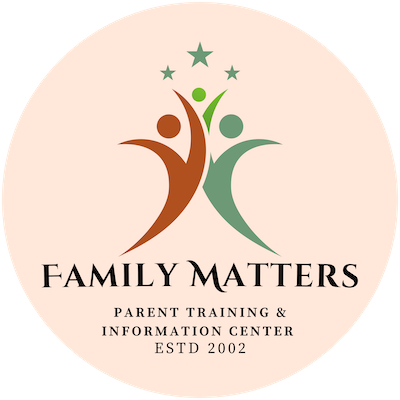Family Engagement
Family engagement in the school system is critical to developing a successful school environment. Families who feel welcomed and valued in their child's educational environment tend to be more involved in their student's academic success. Families can be involved in more traditional roles, such as room parents, cafeteria volunteers, reading tutors, and craft helpers. That said, at Family Matters PTIC, we encourage you to think more broadly about the role of parents/guardians in the school system. Families can review the curriculum, participate in family advisory councils, sit on hiring committees, and provide mentoring to educators and other families. Bringing the family voice to the table within the school system can provide opportunities for partnership, community connections, and improved student outcomes.
What questions should parents and guardians ask about school involvement?
What opportunities are available to volunteer at the school?
Are there projects or programs that are in particular need of volunteer support?
How does the school involve parents on internal committees, like hiring committees or curriculum review committees?
What are some areas of success or struggle the school has had in involving families in the past?
What efforts are made to include underserved or vulnerable families within the school environment?
Has the school completed a parent engagement assessment, and if so, what themes were noted?
How does the school notify families of volunteer needs?
Is there a Family Advisory Council at the school?
But how can a school get started?
Examine the current state of family involvement. What percentage of families show up to participate in parent-teacher conferences and IEP meetings? Is a consistent group of family volunteers present in the classrooms throughout the school? Talk with current families about their experiences volunteering in the school. Learn about areas of opportunity where you can connect parents/guardians with particular skills and interests to the needs of particular teachers, classrooms, or projects. Ensure that parents know what volunteer opportunities are available and structure the opportunities in the most flexible way possible.
Consider building a Family Advisory Council, and ensure diverse student and family representation. Explore how to ensure that students & families who may be more vulnerable to underrepresentation are at the table, including students with disabilities, LGBTQIA students, students of color, non-English speaking students, students experiencing unstable housing, and other vulnerable groups. Utilize the Family Advisory Council to review policy and procedures, discuss current challenges in the school setting and school culture, explore staff wellness and support, develop potential school projects, and develop community partnerships that may benefit students.
Resources on Family Advisory Councils in the School Setting
More Resources

